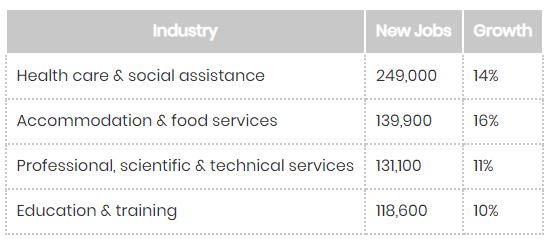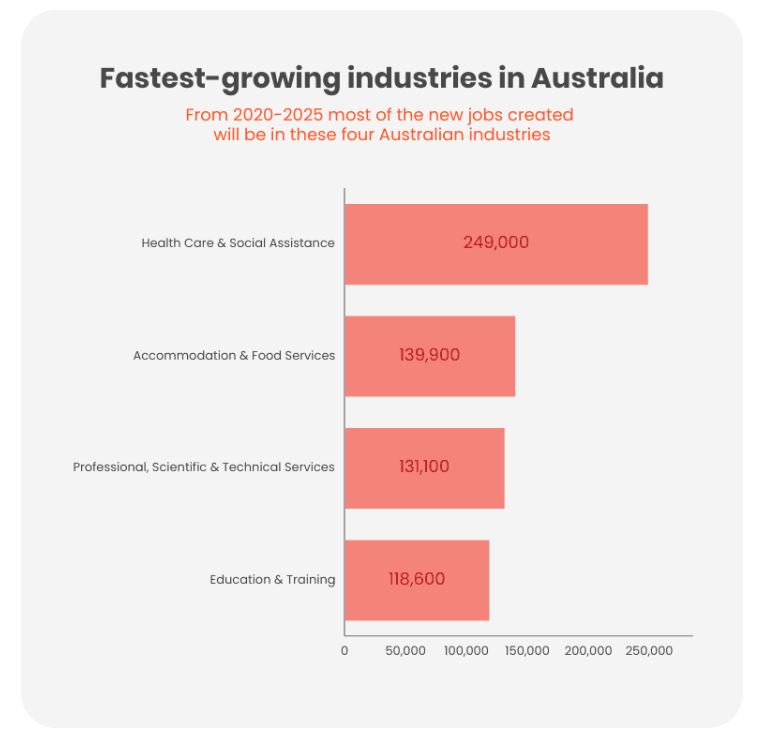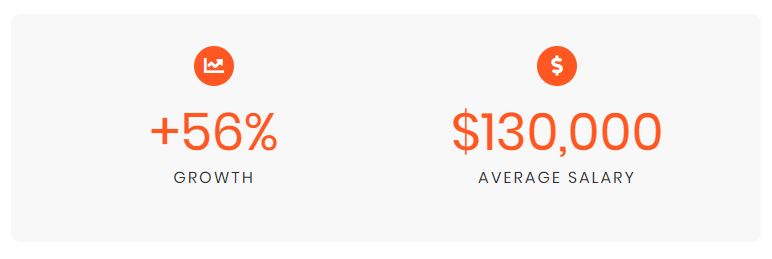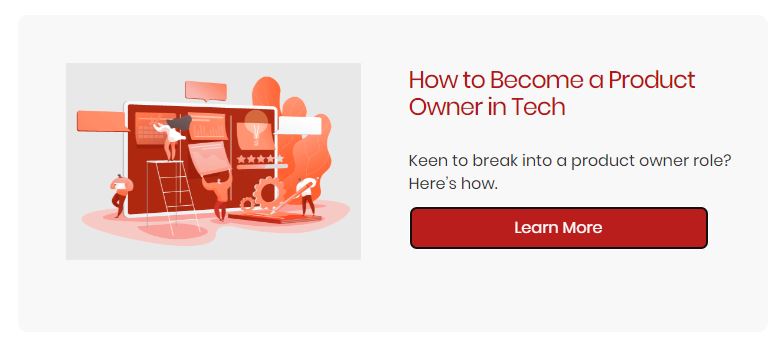Future-Proof Jobs & Industries in Australia: Best Jobs for the Future

What will the jobs of the future look like? What careers are future-proof?
There are changes in motion that will affect your career path. New technologies were already reshaping the job market before coronavirus hit, but the pandemic has forced this trend to ramp up speed, pushing us closer to the future of work.
So what does this mean for you?
If you don’t pay attention, you might get left behind. But if you step to it, you could move into one of the best emerging jobs and future proof your career.
In this article, we’ll take you through:
- Future-proof jobs on the rise in booming industries
- The industries creating the largest number of new jobs
- High-paying, high-potential jobs for the future
Future-proof jobs within booming industries
According to LinkedIn data, these industries are on the rise, bouncing back strongly from the impacts of COVID-19. Within each industry, these are the most in-demand roles, making them some of the best jobs of the future across a wide range of industries.
| Industry | Top job titles |
| Healthcare | • Mental health specialist • Frontline medical staff • Social worker • Allied health assistant |
| Construction | • Construction site manager • Construction estimator • Heavy equipment operator • Construction worker • Forklift operator |
| Customer service | • Customer service consultant • Customer assistant • Customer support specialist • Customer contact representative • Customer service specialist |
| Professional and personal coaching | • Life coach • Health coach • Business coach • Career development specialist • Leadership coach |
| Real estate | • Mortgage broker • Real estate specialist • New home sales specialist • Real estate agent |
| E-commerce | • Supply chain assistant • Warehouse team lead • Online specialist • Ecommerce coordinator specialist • Treasurer |
| Digital content creation | • Podcaster • Blogger • Content writer • Copywriter • Content coordinator |
| Education | • Early childhood educator • School principal |
| Finance | • Anti-money laundering analyst • Risk analyst • Equity trader • Tax consultant • Financial consultant |
| Digital marketing | • Growth hacker • Content designer • Search engine optimization specialist • Social media marketing manager • Growth specialist |
| Software engineering | • Back end developer • Web developer • Head of engineering • Data manager |
| Cyber security | • Cyber security analyst • Cyber security specialist |
What industries will create the most new jobs?
Over the next five years (2020-2025), the LMIP predicts that most of the new jobs created will be in these 4 Australian industries:

Source: LMIP Employment Projections

Most promising, high-paying jobs for the future in Australia
1. Data Scientist

What do data scientists do?
Data scientists drill down into large sets of data and gather useful insights. They spend their time collecting, cleaning and analysing data, developing machine learning algorithms, and presenting their findings to various stakeholders.
What has driven demand?
As organisations increasingly make decisions based on data, the demand for expert data wranglers has skyrocketed. Demand isn’t limited to the business sector, as large government projects also rely heavily on data scientists to improve outcomes.
What experience will be helpful?
Often, top data scientists have previously worked in academia or research, making them difficult to recruit. As a result, hiring competition can be fierce.
- Researcher
- PhD
- Software engineer
- Tutor
What skills will you need to become a data scientist?
44% of data scientists in Australia have a PhD, but it’s not mandatory! A good understanding of the following areas will be helpful in entering the field.
- Machine learning
- Analytics
- Data mining
- SAS (Statistical Analysis System)
- Big data
2. Site reliability engineer

What do Site Reliability Engineers do?
SREs ensure that a site is reliable, scalable and functioning well. While the definition for this job can be flexible, it’s generally understood to mean using code to automate site operations, using a software engineering approach. The role was created by Google and originally found in tech companies, but demand is expanding across many different industries. It’s an approach more than a fixed model, and combines software engineering with systems analysis and development.
What has driven demand?
Now ‘every company is a software company’, and much of that software is cloud-based or built on online platforms. So, site reliability engineers are becoming a necessity for many large companies who rely on a customer-facing website to conduct their business or operations.
What experience will be helpful?
A Site Reliability Engineer role is a senior IT role, similar in level to an architect. As such, it will require pretty extensive experience with large systems, perhaps in a Development Operations, Software Engineering or Systems Analyst or Architect Role.
What skills will you need to become a Site Reliability Engineer?
- Linux
- Python
- Software Development
- Database Administration & Development
- Cloud Computing
- SQL

3. Enterprise account executive

What do enterprise account executives do?
Enterprise account executives are high-level account managers. They manage relationships with larger ‘enterprise’ customers. Their key responsibilities are to drive sales by forming new relationships, developing new markets, promoting the brand, and maintaining existing relationships.
What experience will be helpful?
Enterprise account executives usually have extensive experience in sales and account management, with at least 3 years tenure in a senior role, like:
- Senior account executive
- Account manager
- Sales manager
What skills will you need to become an enterprise account executive?
A Bachelor’s Degree in Business or Marketing is the norm, but is not required. It’s more important to have experience in similar roles and mastery of these required skills:
- Salesforce
- Cloud computing
- Solution selling
- SaaS (Software as a Service)
- Sales management
4. Product designer

What do product designers do?
Product designers are essentially designers working in tech who solve problems by creating products for businesses or consumers. They conduct user research, develop new products from concept to final production. Once a product has been launched, they constantly monitor and test its performance, so they can optimise it to improve the user experience, visual appeal and efficiency. Product design has three types: system, process, and interface design.
What experience will be helpful?
A strong portfolio of product design projects is your biggest asset here, and experience in these roles will also help:
- UX Designer
- UI Designer
- Mechanical Designer
- Graphic Designer
What skills will you need to become a product designer?
- Product design
- UX (user experience)
- User interface design
- Graphic design
- Adobe Suite
5. Product owner

What do product owners do?
A Product Owner plans and prioritizes the work of a software development team, maximising the value they provide to an organisation.
In the Agile software development method, the product owner is responsible for the backlog of tasks, making sure that developers are working on the right thing, at the right time, in the right order.
This is a leadership role involving a high level of communication between stakeholders, business strategy and project management.
What experience will be helpful?
Product owners are typically seasoned project managers and business analysts with a thorough understanding of Agile and Scrum. Previous experience in product and tech using those frameworks will help you land this job.
- Business analyst
- Project manager in tech
- Product manager
- Software engineer
What skills will you need to become a Product Owner?
A degree with a major in business or computer science is the most common qualification. 82% of Product Owners have at least a bachelor’s level, and over a third have a master’s. That being said, you may find your way into this role through relevant work experience if your degree isn’t relevant.
- Business analytics
- Agile methodologies
- Scrum
- Business process improvement
- Product strategy

6. Customer success manager

What do customer success managers do?
This role is an evolution of your classic sales or account manager role for digital companies. You’ll find them primarily working with Software as a Service, particularly cloud and subscription-based services (such as cloud-based accounting tools or creative suites).
Customer success managers help customers use their products effectively. Rather than acquiring new customers, which is a cost-intensive process, they aim to keep their existing customers happy and retain them as subscribers.
What has driven demand?
This role has enjoyed massive growth over the past five years due to the rise of Software as Service (cloud and subscription-based business models)
What experience will be helpful?
Previous experience in related fields and roles will be beneficial, like:
- Account manager
- Tech support
- Project manager
- Business development manager
What skills will you need to become a customer success manager?
Even though this is a role in a tech company, it does not require a STEM-based skillset. It’s much heavier on the soft skills, as much of the role is relationship-centric. As such, it would be very suited to people who love people!
- Enterprise software management
- SaaS (Software as a Service)
- Customer Relationship Management (CRM)
- Salesforce
- Customer satisfaction
- Cloud computing
7. Engagement manager

What do engagement managers do?
Working for vendor companies, an engagement manager builds and maintains relationships with clients, serving as the first point of contact throughout a project. They help the clients use the company’s services effectively, solve customer problems, make sure that contract terms are met, oversee billing and invoicing, and manage project performance. They also lead the customer engagement team, managing resources like specialised consultants and reporting to senior management.
What experience will be helpful?
A background in sales and project management will be beneficial, and specialised experience in a particular industry will be very helpful.
- Consulting
- Program manager
What skills will you need to become an engagement manager?
In addition to extensive relevant work experience, bachelor’s degree in computer science or IT is usually needed. Many engagement managers also have a postgraduate degree (i.e. masters or higher).
- Program management
- Business analysis
- Business process improvement
- Analytics
- Customer Relationship Management (CRM)
How to prepare for the jobs of the future
If you’ve decided it’s time to change careers, hiring managers are now treating skills as more important than previous job titles.
According to research by the Department of Jobs and Small Business in the US, about 70% of employers value soft skills as much, or even more than technical skills. In a recent report, LinkedIn found that employers prized these skills above all:
- Adaptability
- Culture fit
- Collaboration
- Leadership
- Growth potential
- Decision-making & prioritisation
The report recommended that hiring managers should try and hire for skills rather than past jobs, which means even if you don’t have the exact right experience on your resume, you may have the skill set that employers are looking for.
That’s one really good reason to constantly upskill yourself, in accordance with what jobs and industries are on the rise.
The most effective way of future-proofing your job in Australia is to always be upskilling and building new skills, since career change will be based on your transferable skills rather than experience in specific roles.